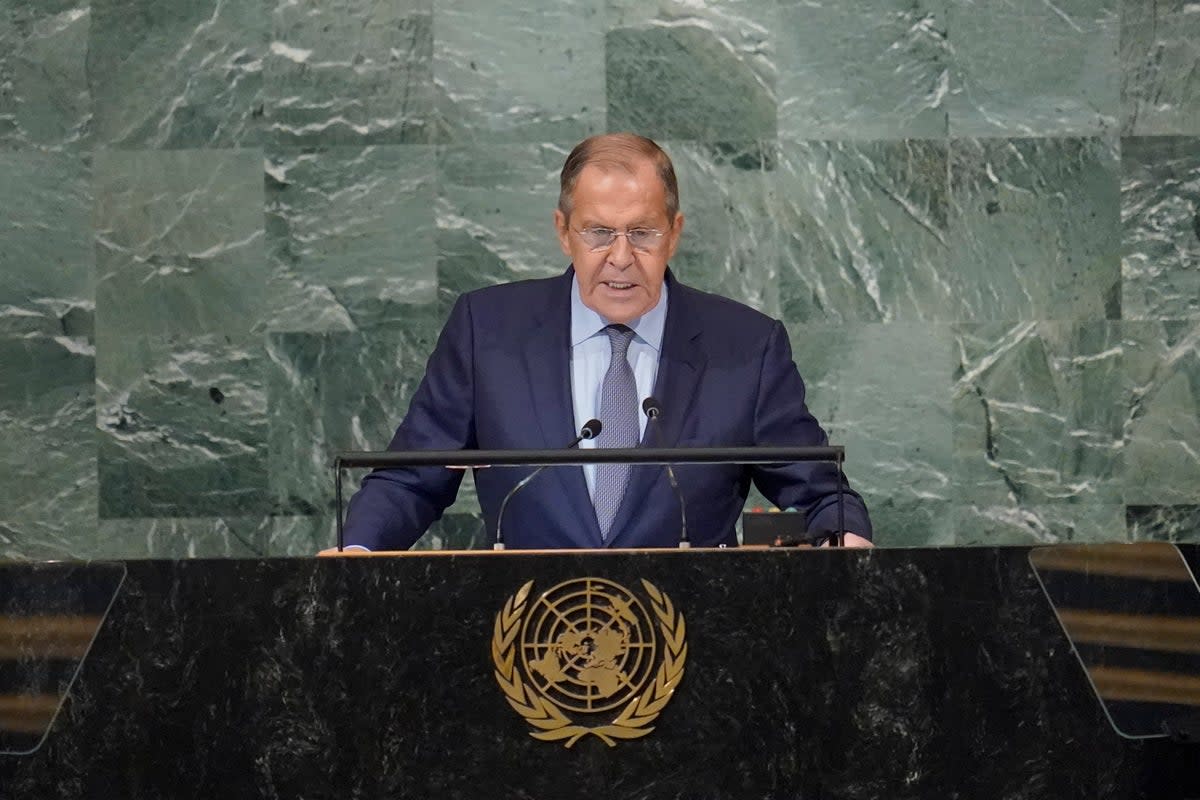On Ukraine, Russia repeats insistence that it had no choice

- Oops!Something went wrong.Please try again later.
- Oops!Something went wrong.Please try again later.
Russia made its case to the world Saturday for its war in Ukraine, repeating a series of grievances about its neighbor and the West to tell the U.N. General Assembly meeting of world leaders that Moscow had “no choice” but to take military action.
At the heart of Foreign Minister Sergey Lavrov's address was a claim that the United States and its allies are aggressively undermining the international system that the U.N. represents — not, as the West maintains, the other way around.
“The future of the world is being decided today,” he said, and “the question is whether or not it is going to be the kind of order with one hegemon at the head of it.”
His speech was Russia's chance to respond to days of denunciations from the podium at the premier annual gathering of presidents, premiers, monarchs and government ministers.
The war has largely dominated the discussion, with many countries laying into Russia for its Feb. 24 invasion, nuclear threats, allegations of atrocities and war crimes, and ratcheting up its campaign by mobilizing some of its reserves even as the assembly met.
The speech came amid voting in Russian-occupied parts of eastern and southern Ukraine on whether to join Russia. Moscow characterizes the referendums as self-determination, but Kyiv and its Western allies view them as Kremlin-orchestrated shams with a foregone conclusion.
Some observers think the expected outcome could serve as a pretext for Russian President Vladimir Putin eventually to escalate the war further.
“We can expect President Putin will claim any Ukrainian effort to liberate this land as an attack on so-called ‘Russian territory,’" U.S. Secretary of State Antony Blinken warned the U.N. Security Council on Thursday.
Russia has offered a number of explanations for what it calls a “special military operation.” Among them: risks to Russia from what it considers a hostile government in Kyiv and a NATO alliance that has expanded eastward over the years; restoring what Russia considers to be its historical territorial claims on the country; and protecting Russians living in Ukraine — especially its eastern Donbas region — from what Moscow views as the Ukrainian government’s oppression.
“The incapacity of Western countries to negotiate and the continued war by the Kyiv regime against their own people left us with no choice” but to recognize two separatist regions of Ukraine as independent and then to send troops in, Lavrov said.
The aim was “to remove the threats against our security, which NATO has been consistently creating in Ukraine,” he explained.
While Ukraine has recently driven Russian troops from some areas in the northeast, Ukrainian President Volodymyr Zelenskyy earlier this week warned the assembly that he believes Moscow wants to spend the winter getting ready for a new offensive, or at least preparing fortifications while mobilizing more troops.
Regardless, he declared that his forces will ultimately oust Russian troops from all of Ukraine.
“We can do it with the force of arms. But we need time,” said Zelenskyy, the only leader who was allowed to address the assembly by video this year.
The two countries also faced off this week at the Security Council, in a rare moment when Lavrov and his Ukrainian counterpart, Dmytro Kuleba, were in the same room — though they kept their distance.
The General Assembly voted overwhelmingly in March to deplore Russia’s aggression against Ukraine, call for immediate withdrawal of all Russian forces, and urge protection for millions of civilians. The next month, members agreed by a smaller margin to suspend Russia from the U.N. Human Rights Council.
___
For more AP coverage of the U.N. General Assembly, visit https://apnews.com/hub/united-nations-general-assembly

